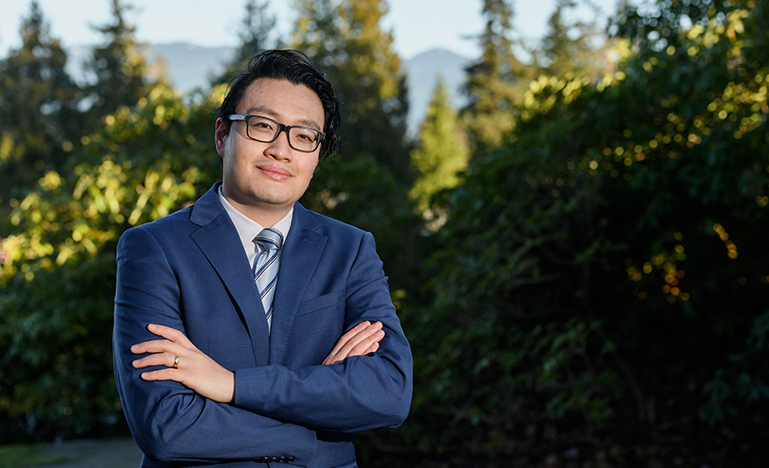Reclaiming their names
Heron Law is doing its part for reconciliation by helping Indigenous clients get their traditional names back.

It’s not every day that lawyers practicing in small or solo firms find the perfect community project to support on a pro bono basis. When the federal government quietly announced Indigenous people in Canada would be eligible to reclaim their traditional names on official documents such as passports without having to pay a fee, Vancouver immigration lawyer Wei William Tao immediately took to Twitter.
His recently launched law firm, Heron Law, would assist Indigenous clients free of charge, he announced. It would also cover any incidental expenses not covered by the federal government offer, such as copies and courier charges.
It's been an interesting year for Tao. He's the 2020 recipient of the CBA Immigration Law Section Founders' Award and the 2021 Immigration Section Volunteer Recognition Award. He's also in the process of changing his own name to Wei. "My parents gave me the Chinese name first, very intentionally," he explains. "I never had an English name until elementary school. I added it myself to try to fit in. It's definitely a journey. We're seeing so much worry from Indigenous applicants who wish to do the same thing, and definitely with much more traumatic, intergenerational traumatic histories and stories that they begin to share with us."
The government's Indigenous name reclamation program is in answer to the Truth and Reconciliation Commission's Call to Action 17 for governments to facilitate name reclamation for residential school survivors and their families at no fee for a period of five years.
Jeffrey MacDonald, a spokesperson for Immigration, Refugees and Citizenship Canada, explained in an email that the Canadian government had been answering requests for name reclamation by First Nations, Inuit and Métis individuals, on a case-by-case basis, since the release of the TRC's final report.
"We have now established a formal process for residential school survivors and their families and all Indigenous peoples to reclaim their Indigenous names on replacement of valid passports, travel documents, citizenship certificates and permanent resident cards free of charge, until May 30, 2026," MacDonald added.
So far, uptake is slow. As of July 2021, IRCC had received "fewer than five" requests for reclaimed Indigenous names on passports and they have "not received any request to reclaim Indigenous names on replacement permanent resident cards or citizenship certificates."
Many barriers
Call to action 17 is addressed to "all levels of government," but provinces have yet to get on board. Many who contact Will Tao are surprised to hear they must first go through the provincial process to have their name changed, a key piece of information not immediately obvious when you consult the federal government's website.
Indigenous name reclamation is "very much a process," Tao says, as it involves forms and notarization requirements. "For those who are applying, there are many questions. 'Should we even continue to work with these institutions that have oppressed us for this long?' 'What is this gesture? Is it meaningful?' And then who is facilitating it, right?"
It would seem to be nobody, except for volunteers like Tao. And while the federal application fees are waived, incidental costs can easily run into the hundreds of dollars.
Indigenous people who want to proceed with their name change face other barriers -- lengthy delays, bureaucratic frustration and the limitations of the Roman alphabet. Many Indigenous languages include special characters or numbers. Up to a point, Tao says, you can understand the government needs time to change its document printing processes to broaden its offer of name reclamation to include most Indigenous spellings. "But it seems very contradictory, I would say, to have a name reclamation process and then say you can only change it to French Roman characters."
Relationships, trust and stories
Tao and his team recognized right away that building trust with Indigenous communities was the starting point of the name reclamation work. When someone who is not Indigenous offers help, he explains, there can be a certain hesitation. If he were in their shoes, he says, he would wonder what their motivation is. "How do we create those environments? How do we have these conversations? Individuals want to tell their stories, but this process doesn't ask for what your story is and why. It just says, here are the forms to fill out. It's very bureaucratic."
Tao and his partners have their work cut out for them in the next five or six years they believe this project will take. "We want to make sure that we're not recreating the mistakes that the system with the government requests have created," he says. "Don't rush it. Don't try and force something that's not there. Build trust first. Build relationships first."
Tao says he's happy to have his firm be a resource for lawyers across the country who might want to take part in the Indigenous name reclamation process as their community project. "To help someone navigate a process they should never need to go through in the first place is a different conversation," he says. "One that we need to have first with ourselves to figure out how to provide assistance in the most compassionate way possible. Especially in these times."


